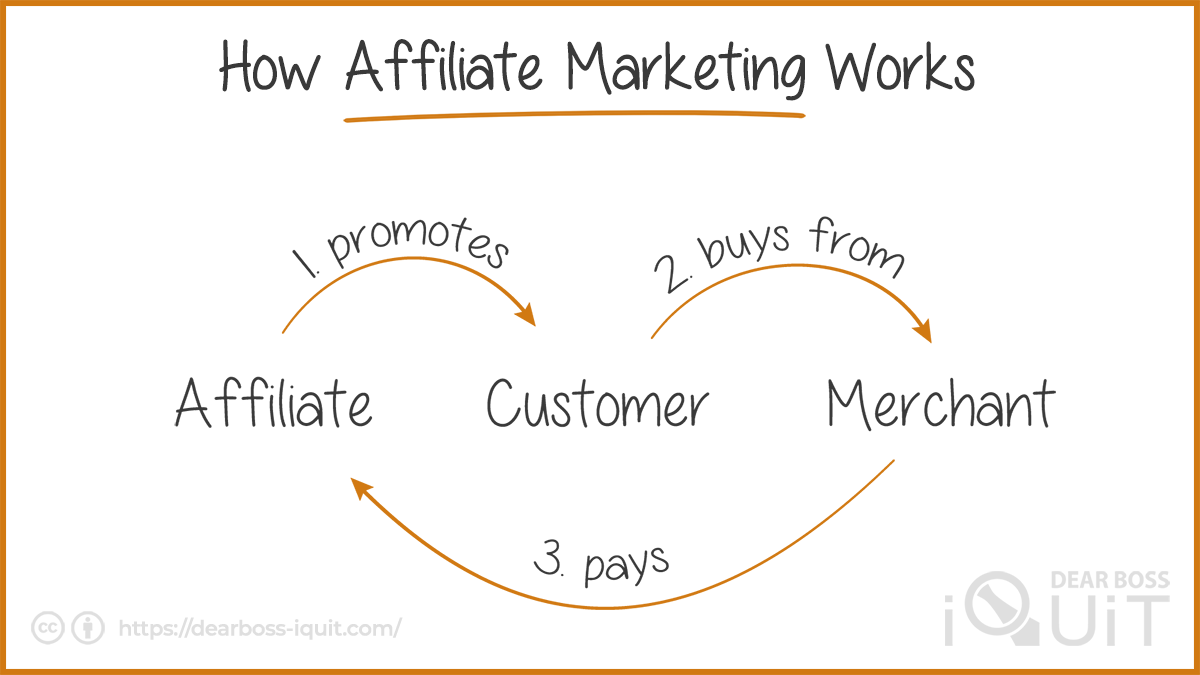High-ranking content is the holy grail of becoming a successful affiliate marketer.
However, creating such content is no piece of cake. If it were, affiliate marketing failure rates would be much lower.
Since you’re here, I’m guessing that you’ve hit a brick wall content-wise. You’ve gotten sick of writing and publishing underperforming content that attracts very little low-converting traffic or maybe no traffic.
Been there, done that. And let me tell you, I hate nothing more than investing my precious resources in creating content that generates no results.
If you can relate, you’re in the right place.
In this article, I’ll be sharing a few easy-to-implement tips that’ll help you boost the overall quality of your content so that it yields more traffic that actually purchases the affiliate products you promote.
Before we get started, let’s recap what affiliate marketing is and how it works.
What Is Affiliate Marketing? How Does It Work?
Affiliate marketing is an online business model that enables people to earn commissions for referring customer sales to third-party online merchants.

There are millions of available affiliate programs offered by all kinds of companies, ranging from big retailers like Amazon and eBay to solopreneurs who’re after selling their handmade crafts.
One of the most significant benefits of affiliate marketing is that getting started requires little to no monetary investment. All you need to do is pick a niche, sign up for relevant affiliate merchants, and then start promoting your affiliate links on one or more digital marketing channels by publishing content that appeals to your target audience.
Content comes in many shapes and sizes, such as:
- Blog Posts
- Videos
- Podcasts
- Images
- Landing Pages
- Case Studies
- & more
Something all of those content types have in common is that they’re based on written material.
And while creating written material is as simple as putting words together, writing unique, high-ranking content that converts those who consume it to paying customers is a whole other story.
So, how can someone optimize their content for maximizing affiliate conversions?
Let’s take a closer look.
Best Affiliate Marketing Courses
Best Affiliate Courses
How to Write High-Ranking Content for Affiliate Marketing
What would you do if you were reading a blog, or watching a YouTube video that made no sense, delivered no helpful info, or bored you to death? Chances are that you’d ditch it for a higher-quality piece.
Well, the same applies to anyone who consumes content online. They not only dump low-quality content but also lose interest in any subsequent piece of content published by the same author in the future.
That’s why it’s crucial to ensure that every piece you put out there is valuable, engaging, in-depth, and well-optimized both for readers and search engines.
Need help understanding how to create such content?
Take stock of the six straightforward tips below.
1. Always Deliver Value
People read content for a specific reason. They look for valuable info that could help them get closer to solving a problem they’re facing.
If your content fails to deliver that info, no one will purchase the affiliate products you promote throughout it.
Countering that is simple.
All you have to do is always ensure that your content contains all the vital info that could bring your visitors closer to the solution they’re looking for.
The four steps to accomplishing that are:
- Putting yourself in the shoes of your readers
- Understanding the problem they’re after solving
- Identifying potential solutions
- Writing until you’ve fully covered all of them
Lastly, explain how the product you promote can help them reach their desired outcome better, easier, and faster.
I guarantee that mastering this process will be a gamechanger for your affiliate endeavors.
Affiliate marketing is a game of value, not sales. If you deliver no value, you’ll be making no sales (unless maybe you’re an exceptional salesperson).
2. Be Unique
Writing unique content from scratch is undeniably hard.
However, some affiliate marketers seem to have found a way around the writing process by copying content from other sites, changing a few words here and there, adding a couple of sentences, and then publishing it as their own.
If that’s you, it’s no surprise your content’s failing.
Search engines can effortlessly identify rehashed content. And once they do, they keep it buried on the last pages of their SERPs.
If you’d like your content to start ranking and converting better, you need to ensure that it doesn’t contain any info copied from already existing articles, either intentionally or unintentionally.
A simple way to do that is by scanning your content with an online plagiarism checker and using your own words to rewrite any sections that appear to be plagiarized.
Don’t get me wrong, drawing inspiration from other people’s content is totally understandable. However, copying it and then passing it off as your own would be pointless, not to mention unethical.
Just use it as a reference point to put together a more valuable piece tailored to your brand’s voice, point of view, and overall marketing message.
Unique content goes a long way.
It boosts rankings, traffic, conversions, and trustworthiness.
3. Conduct In-Depth Research
Nowadays, the internet is swarming with fake info, unrealistic claims, false facts, and subpar solutions.
The world doesn’t need more such content. On the contrary, it desperately needs higher-quality content.
And higher-quality content starts with in-depth research.
It might sound harsh, but you’re doomed to fail if you’re a beginner to affiliate marketing with no authority and your content revolves around nothing but your random, unsubstantiated personal opinions.
If you don’t want that to happen, you should start leveraging proper research towards backing your claims up with accurate facts, data, metrics, and statistics drawn from well-established online sources.
Following such an approach has tons of benefits, such as:
- Standing out from competitors
- Educating yourself further
- Discovering alternate viewpoints
- Boosting your credibility
- Winning your readers’ trust
- Skyrocketing your conversions
- Speeding up the writing process
- & more
Doing in-depth research is could be a gamechanger in your affiliate endeavors, especially if you’re no expert in the niche you pursue.
4. Focus on One Niche
Another thing that might inhibit your content’s performance is that you spread your efforts too thin over multiple niches.
Sometimes, beginners to affiliate marketing tend to assume that focusing simultaneously on many different niches would maximize and expedite success.
However, this couldn’t be further from reality.
Trying to be everything to everyone by being superficially involved in numerous niches will only throw your readers off, ruin your credibility, and confuse the search engines.
If you’re making this mistake, it’s time to redesign your approach.
Instead of writing content about any subject under the sun, keep things tightly focused in just one niche for a while. Doing this will help you develop something called “Topical Authority.”
Topical Authority is a Google ranking factor and refers to a website’s perceived authority, expertise, and knowledge in a particular topic.
Simply put, Google tends to rank websites that possess a lot of in-depth, valuable knowledge around a specific subject a lot higher in its SERPs than those that appear to be all over the place.
On top of that, becoming the go-to expert in a particular niche will undoubtedly boost your trustworthiness and, subsequently, your conversions.
5. Implement Proper SEO
According to EnvisageDigital, 4.4 million new blog posts are published every day. Based on ImpactPlus, 91% of them will never receive any organic traffic from Google.
If you want to ensure that your articles are among the 9% that occupy a decent ranking spot, you’ll have to start properly optimizing them for the search engines.
Unfortunately, SEO is so much more than just writing high-quality content.
Google uses over 200 different factors to determine your website’s ranking position. While you don’t have to tackle every single one of them, if you’d like to stand a chance of being favored in Google’s SERPs, you’ll have to master at least its most important ones, such as:
- Content Lenght
- Backlinks
- Internal Links
- External Links
- HTTPS
- Keyword in Title
- Referring Domains
- Time on Page
- & etc
SEO is undeniably hard, especially if you’re in a highly-competitive niche. And compared to other marketing channels, it involves an enormous learning curve and tons of trial and error until you start getting it right.
That’s why, if you’re planning to use SEO throughout your affiliate marketing endeavors, I strongly suggest that you consider signing up for a high-quality dedicated affiliate marketing course to point you in the right direction.
Doing that will save you massive amounts of time, effort, and frustration, significantly shorten and smoothen your journey, and skyrocket your chances of achieving affiliate success.
6. Always Proofread Your Content
My last tip for better-performing content is to always proofread before publishing. Proofreading can significantly boost your content’s clarity, readability, conciseness, accuracy, and correctness.
Most affiliate marketing beginners tend to distribute their content throughout the internet without checking it for errors, mainly due to a lack of time and experience.
Neglecting to proofread, correct, and polish your content before getting it up and running could hurt its overall quality, rankings, and conversion rates.
“So Harry, which part of my content should I proofread?”
Well, everything from titles and subheadings to its main body’s spelling, grammar, and uniqueness.
You can streamline and expedite the entire process by using a free grammar checker.
Affiliate marketing FAQs
Affiliate marketing is an online business model that involves promoting products or services created and distributed by third-party online merchants in exchange for getting paid a commission for each sale you refer.
In layman’s terms, affiliate marketing is the process of being compensated for helping businesses sell to more customers.
Here’s a bird’s eye view of how affiliate marketing works.
- You join a merchant’s affiliate program
- The merchant gives you a unique affiliate link that points to their e-shop
- You promote your unique affiliate link online (blog, forums, social media, paid ads, etc.)
- Every time someone clicks on your unique affiliate link and makes a purchase on the merchant’s e-shop, the merchant pays you a commission
There are thousands of successful affiliate marketers all around the world. Some of the most well-known ones are:
- Pat Flynn
- Matt Diggity
- Matthew Woodward
- Doug Cunnington
- & more
You can check out a roundup of my 17 favorite examples of affiliate success and their backstories right here.
- Billion-dollar industry
- Very low startup & operational expenses
- Huge income potential
- Flexible & versatile
- Passive income
- Simple to implement
- No technical background
- No customer support
- No physical setup
Affiliate marketers can be divided into five main income groups:
- Total beginners: $0 – $20,000 per year
- Low-level affiliates: $20,000 – $50,000 per year
- Intermediate affiliates: $50,000 – $100,000 per year
- High-level affiliates: $100,000 – $500,000 per year
- Super affiliates: $500,000+ per year
According to PayScale, the average annual income for affiliate marketers in the US is over $54,000 per year. Statistics reveal that 13% of affiliates earn more than $75,000 per year.
Some of the factors that influence how much you earn as an affiliate marketer include:
- seniority
- target niche
- available resources
- previous experience
- marketing efforts
- & overall mindset
Here’s a rough income growth timeline of a typical affiliate marketing business:
- months (0-3): no earnings
- months (3-6): first affiliate sale
- months (6-12): $100-$500 monthly
- months (12-18): $1000 monthly
- months (18-24): $3000+ monthly
This timeline isn’t a guarantee of future performance but rather a mere approximation of the income growth of an average affiliate business. Your own timeline could be shorter or longer than projected.
Over the years, I’ve seen aspiring affiliates striking a gold vein just a few months into the industry. On the other hand, I personally know people who’ve been struggling to grow their affiliate revenue to $1000 per month for several years.
Affiliate marketing is one of the most affordable money-making models out there.
Here’s a breakdown of everything you need to get started as an affiliate marketer along with their associated costs:
- web hosting & domain name: $2.95/month (Bluehost)
- keyword research tool: $49/month (Jaaxy)
- expert guidance: $49/month (Wealthy Affiliate)
- email autoresponder: Free for up to 1000 subs (MailerLite)
Please note that on top of expert guidance, Wealthy Affiliate also provides free access to hosting and a keyword research tool so you don’t have to purchase them separately.
Yes, you can do affiliate marketing without a website by promoting your affiliate links on other marketing channels, such as:
- Social Media
- Paid Ads
- YouTube
- Podcast
- etc.
The process of getting started with affiliate marketing can be broken down into the following four simple steps:
- Pick a niche
- Launch a blog
- Build an audience
- Promote affiliate products
No, you don’t.
Affiliate marketing is very simple to get started with by virtually anyone regardless of age, education, background, available capital, tech-savviness, professional network, etc.
In fact, most 6-figure affiliate marketers were no more experienced than you currently are when they first ventured into the affiliate marketing industry.
Nonetheless, being knowledgeable in fields like marketing, sales, content production, business management, etc., could help you reach your financial goals somewhat faster.
Conclusion
Mastering the art of creating high-ranking content is key to succeeding as an affiliate marketer.
I know that writing such content is no walk in the park but hopefully, the tips I shared throughout this article pointed you in the right direction.
Start applying them right away and I can almost guarantee that you’ll see your content ranking and converting much better in no time.
If you have any questions or require further help, I encourage you to leave a comment right below or contact me right here, and I’ll do my best to get back to you as soon as possible.
Best of luck in your affiliate endeavors!
Harry, Founder & Creative Director at dearboss-iquit.com




